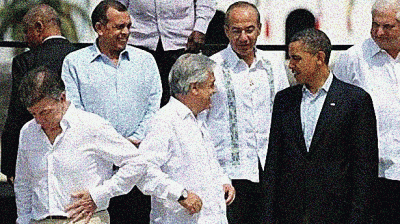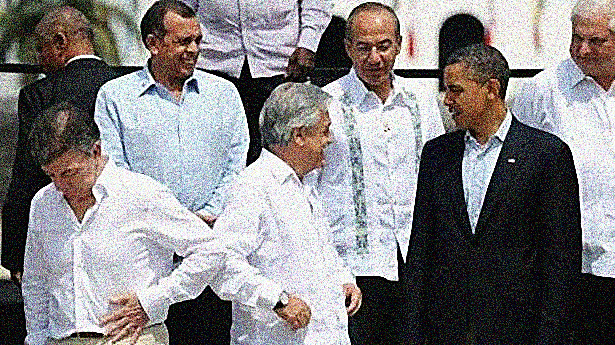 As a rule, anything the New York Times says about developments in Latin America should be taken with a couple of handfuls of salt. The paper regularly does its readers a disservice by painting a picture of developments in the region created in the spirit of the Monroe Doctrine. Case in point: an April 12 report titled “Trade, Energy and Drugs Are Topics for Obama at Summit of the Americas” by correspondent Jackie Calmes, which made the claim that “For the most part, the tension over Cuba seems mostly to be behind Mr. Obama.” According to Calmes, “Ecuador’s president, Rafael Correa, announced earlier this month that he would boycott the meeting in Colombia because Cuba, as usual, was not invited, but he failed to persuade other leftist leaders in the region to do the same,” and that Cuban President Raul Castro “said he did not want to attend anyway, sparing Mr. Obama the prospect of any photo opportunities with a Castro.”
As a rule, anything the New York Times says about developments in Latin America should be taken with a couple of handfuls of salt. The paper regularly does its readers a disservice by painting a picture of developments in the region created in the spirit of the Monroe Doctrine. Case in point: an April 12 report titled “Trade, Energy and Drugs Are Topics for Obama at Summit of the Americas” by correspondent Jackie Calmes, which made the claim that “For the most part, the tension over Cuba seems mostly to be behind Mr. Obama.” According to Calmes, “Ecuador’s president, Rafael Correa, announced earlier this month that he would boycott the meeting in Colombia because Cuba, as usual, was not invited, but he failed to persuade other leftist leaders in the region to do the same,” and that Cuban President Raul Castro “said he did not want to attend anyway, sparing Mr. Obama the prospect of any photo opportunities with a Castro.”
Of course, we have no way of knowing whether Castro actually said that and neither does the Times. However, according to the Associated Press, the Cuban leader had expressed a desire to attend the meeting but was “delicately” told by the Summit host, Colombian President Juan Manuel Santos, that that would be impossible because it would put U.S. President Barack Obama in the position of “facing an awkward meeting with the Cuban leader or having to boycott the summit himself.”
The 6th Summit of the Americas was scheduled for April 14-15 in Cartagena de Indias, Colombia. According to the Falklands/Malvinas-based Merco Press, “Though the summit’s official agenda ranges from technology to poverty reduction, Cuba was once again shaping into the No. 1 hot potato for those gathering in the Caribbean port city.”
There are 43 nations participating in the summit; only two – the U.S. and Canada – oppose Cuba’s participation. On April 12, a pre-summit foreign ministers meeting is said to have failed to agree on a last minute proposal to invite the island nation
However, reading Calmes’ report one might get the impression that the issue of Cuba’s participation in the leadership gathering had ceased to be much of an issue and Correa was isolated in his position. No mention was made of the statement made weeks ago by Bolivia’s President Eva Morales that “We have arrived with the conviction that this must be the last summit without Cuba.” Or, of Santos’ statement: “I hope this is the last summit without Cuba.”
Nor did the Times report note that the recent visit to the US by Brazilian President Dilma Rousseff came following her stay in Cuba and consultations with President Castro. While in Havana she criticized the existence of the U.S. base and prison at Guantanamo Bay, and the U.S. trade embargo against Cuba.
Perhaps more revealing of the Times’ approach to the unfolding situation was its failure to note the symbolism of – or indeed, even report on – the pre-summit visit to Havana of Mexican President Felipe Calderon, where, according to Prensa Latina, he expressed “His government’s interest in bringing relations with Cuba to the highest level.” Calderon arrived in Cuba April 11 for a two-day visit.
According to Reuters, “Calderon said on Wednesday upon his arrival in Havana that ‘in spite of our natural and different points of view about various issues,’ an effort would be made during the visit to ‘take our bilateral relation to its best level’.”
“We want to broaden trade and investment between Cuba and Mexico,” Calderon told journalists in Havana. ““We are interested in cooperating in health, education, culture and sports, as well as in bilateral exchanges in energy,” said Calderon. “My visit is due mainly to the friendship and brotherhood existing between the two peoples.”
From Cuba Calderon flew to Haiti and from there was on to the Summit in Colombia.
As it turned out that the exclusion of Cuba was indeed a big hot potato at Cartagena de Indias and it is clear the issue is not going away. Despite the wishes of Washington and Ottawa this was almost certainly
the last time the pushy norteamericanos determine who comes to summits and who does not.
Carl Bloice, a member of the National Coordinating Committee of the Committees of Correspondence for Democracy and Socialism, is a columnist for the Black Commentator. He also serves on its editorial board.
